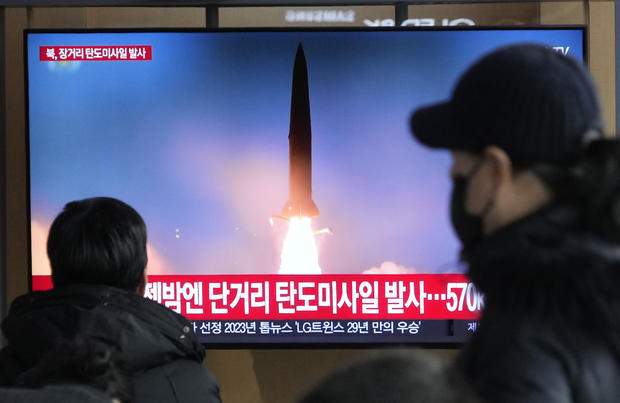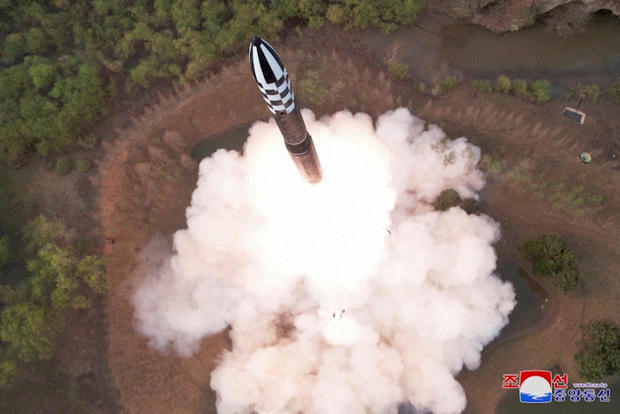North Korea test launches apparent long-range missile designed to carry nuclear warhead, hit U.S. mainland
Tokyo — North Korea test launched two missiles in the 24 hours leading up to Monday morning, U.S. time, the second one an intercontinental ballistic missile (ICBM) theoretically capable of reaching anywhere in the U.S. mainland, according to officials in South Korea and Japan.
North Korea didn't immediately confirm any details of its latest launches, but defense officials in South Korea and Japan — both close U.S. allies — said the long-range rocket travelled just over 600 miles before splashing down in the sea northwest of Tokyo and west of Japan's northern island of Hokkaido.
The North's leader Kim Jong Un watched with a smile as his military showed off its new long-range missiles during recent parades in the capital city of Pyongyang — some of them likely similar to the one launched Monday morning.
This has been a record year for North Korea's weapons testing program. The nation has launched at least 36 missiles, including a rocket that carried a spy satellite into space in November.
South Korean officials described the long-range weapon tested Monday as a solid fuel-powered missile, suggesting it was probably the Kim regime's Hwasong-18 ICBM. A solid fuel system, compared to the older liquid fuels, makes a missile much more mobile and faster to deploy, and from anywhere its launch vehicle can be driven.
That makes such a weapon system more difficult for adversaries to detect and prepare for prior to a launch.
Adm. John Aquilino, head of the U.S. military's Indo-Pacific Command, was quoted Monday by Japan's Kyodo news agency as saying that all of North Korea's "increased missile capabilities and testing — from ICBM all the way to the space launch vehicle last month — is concerning."
But he told reporters in Tokyo that the U.S., Japan and South Korea had been "able to predict a launch" and, just two days before it, "actually pushed our ballistic missile defense ships forward to be postured to defend our three nations for this expected launch."
He acknowledged the challenges presented by North Korea's modern weapons systems, calling it "incredibly hard" to locate a launcher and position forces to respond in advance of a launch. He vowed, however, the allies would "continue to work to get in front of any launches as opposed to being responsive after."
The Hwasong-18 — designed to be tipped with a nuclear warhead — has been tested by North Korea previously, and Kim has described it as the most powerful weapon in his country's nuclear arsenal.
All of North Korea's launches violate United Nations Security Council resolutions that ban missile development by the Kim regime. Kim, however, insists his isolated nation needs to develop its weapons, including its nuclear missiles, to defend against the threat of an attack by the U.S. and its allies.
Washington, Seoul and Tokyo insist the threat to regional peace is from Kim and his military and they say there's no intention to attack or invade North Korea.
The two most recent launches appeared to be a response by Kim's government to nuclear deterrence talks taking place in Washington between the U.S. and South Korea - and the reported arrival over the weekend of a U.S. nuclear-powered submarine in South Korea's Busan port.






